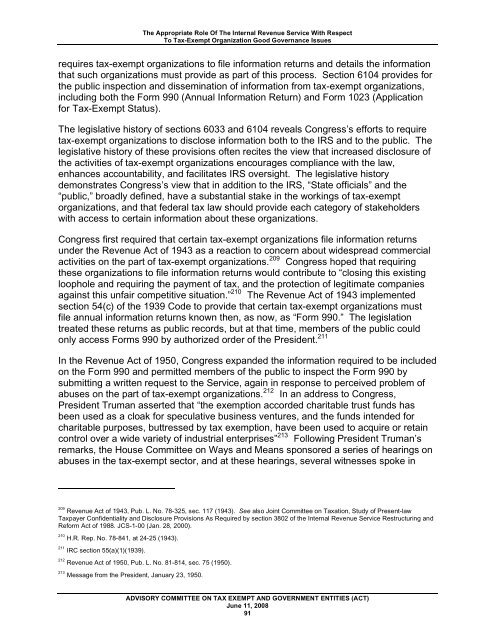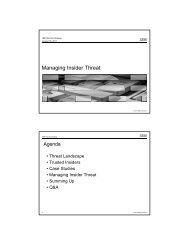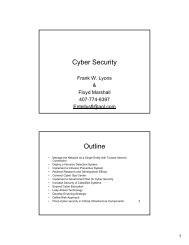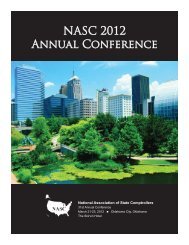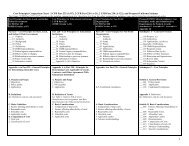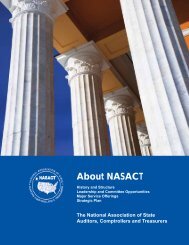Advisory Committee on Tax Exempt and Government Entities (ACT ...
Advisory Committee on Tax Exempt and Government Entities (ACT ...
Advisory Committee on Tax Exempt and Government Entities (ACT ...
You also want an ePaper? Increase the reach of your titles
YUMPU automatically turns print PDFs into web optimized ePapers that Google loves.
The Appropriate Role Of The Internal Revenue Service With Respect To <strong>Tax</strong>-<strong>Exempt</strong> Organizati<strong>on</strong> Good Governance Issuesrequires tax-exempt organizati<strong>on</strong>s to file informati<strong>on</strong> returns <strong>and</strong> details the informati<strong>on</strong>that such organizati<strong>on</strong>s must provide as part of this process. Secti<strong>on</strong> 6104 provides forthe public inspecti<strong>on</strong> <strong>and</strong> disseminati<strong>on</strong> of informati<strong>on</strong> from tax-exempt organizati<strong>on</strong>s,including both the Form 990 (Annual Informati<strong>on</strong> Return) <strong>and</strong> Form 1023 (Applicati<strong>on</strong>for <strong>Tax</strong>-<strong>Exempt</strong> Status).The legislative history of secti<strong>on</strong>s 6033 <strong>and</strong> 6104 reveals C<strong>on</strong>gress’s efforts to requiretax-exempt organizati<strong>on</strong>s to disclose informati<strong>on</strong> both to the IRS <strong>and</strong> to the public. Thelegislative history of these provisi<strong>on</strong>s often recites the view that increased disclosure ofthe activities of tax-exempt organizati<strong>on</strong>s encourages compliance with the law,enhances accountability, <strong>and</strong> facilitates IRS oversight. The legislative historydem<strong>on</strong>strates C<strong>on</strong>gress’s view that in additi<strong>on</strong> to the IRS, “State officials” <strong>and</strong> the“public,” broadly defined, have a substantial stake in the workings of tax-exemptorganizati<strong>on</strong>s, <strong>and</strong> that federal tax law should provide each category of stakeholderswith access to certain informati<strong>on</strong> about these organizati<strong>on</strong>s.C<strong>on</strong>gress first required that certain tax-exempt organizati<strong>on</strong>s file informati<strong>on</strong> returnsunder the Revenue Act of 1943 as a reacti<strong>on</strong> to c<strong>on</strong>cern about widespread commercialactivities <strong>on</strong> the part of tax-exempt organizati<strong>on</strong>s. 209 C<strong>on</strong>gress hoped that requiringthese organizati<strong>on</strong>s to file informati<strong>on</strong> returns would c<strong>on</strong>tribute to “closing this existingloophole <strong>and</strong> requiring the payment of tax, <strong>and</strong> the protecti<strong>on</strong> of legitimate companiesagainst this unfair competitive situati<strong>on</strong>.” 210 The Revenue Act of 1943 implementedsecti<strong>on</strong> 54(c) of the 1939 Code to provide that certain tax-exempt organizati<strong>on</strong>s mustfile annual informati<strong>on</strong> returns known then, as now, as “Form 990.” The legislati<strong>on</strong>treated these returns as public records, but at that time, members of the public could<strong>on</strong>ly access Forms 990 by authorized order of the President. 211In the Revenue Act of 1950, C<strong>on</strong>gress exp<strong>and</strong>ed the informati<strong>on</strong> required to be included<strong>on</strong> the Form 990 <strong>and</strong> permitted members of the public to inspect the Form 990 bysubmitting a written request to the Service, again in resp<strong>on</strong>se to perceived problem ofabuses <strong>on</strong> the part of tax-exempt organizati<strong>on</strong>s. 212 In an address to C<strong>on</strong>gress,President Truman asserted that “the exempti<strong>on</strong> accorded charitable trust funds hasbeen used as a cloak for speculative business ventures, <strong>and</strong> the funds intended forcharitable purposes, buttressed by tax exempti<strong>on</strong>, have been used to acquire or retainc<strong>on</strong>trol over a wide variety of industrial enterprises” 213 Following President Truman’sremarks, the House <str<strong>on</strong>g>Committee</str<strong>on</strong>g> <strong>on</strong> Ways <strong>and</strong> Means sp<strong>on</strong>sored a series of hearings <strong>on</strong>abuses in the tax-exempt sector, <strong>and</strong> at these hearings, several witnesses spoke in209Revenue Act of 1943, Pub. L. No. 78-325, sec. 117 (1943). See also Joint <str<strong>on</strong>g>Committee</str<strong>on</strong>g> <strong>on</strong> <strong>Tax</strong>ati<strong>on</strong>, Study of Present-law<strong>Tax</strong>payer C<strong>on</strong>fidentiality <strong>and</strong> Disclosure Provisi<strong>on</strong>s As Required by secti<strong>on</strong> 3802 of the Internal Revenue Service Restructuring <strong>and</strong>Reform Act of 1988. JCS-1-00 (Jan. 28, 2000).210H.R. Rep. No. 78-841, at 24-25 (1943).211IRC secti<strong>on</strong> 55(a)(1)(1939).212Revenue Act of 1950, Pub. L. No. 81-814, sec. 75 (1950).213Message from the President, January 23, 1950.ADVISORY COMMITTEE ON TAX EXEMPT AND GOVERNMENT ENTITIES (<strong>ACT</strong>) June 11, 2008 91


